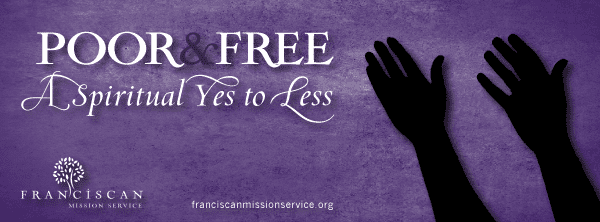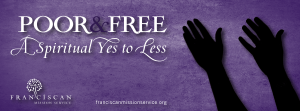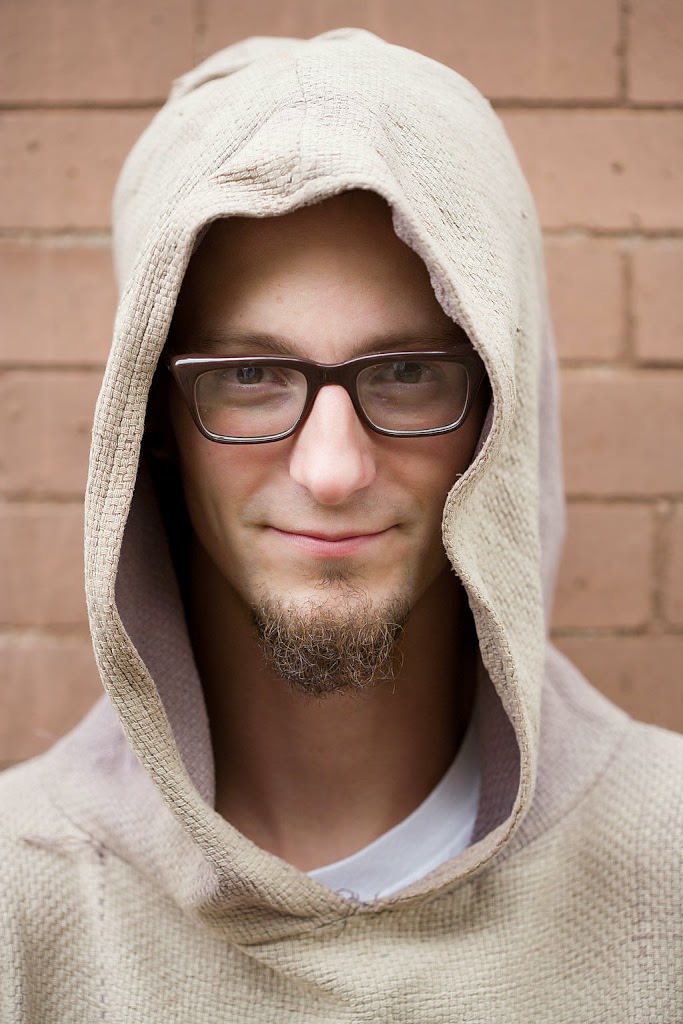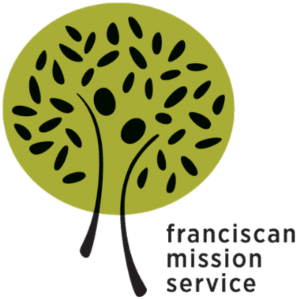Poor and Free: The Shane Claiborne Interview Part I

Franciscan Mission Service presents:
- Shane Claiborne: Part I, Part II, and Part III
- Gigi Gruenke: “Invest in God’s Dream”
- Jack Jezreel: “The Simple Math of Voluntary Simplicity”
- Amy Echeverria: “Saying ‘Yes’ to Love”
- Sr. Marie Lucey (OSF): “Faith Keeps Hope Alive”
- Marie Dennis: “Beyond Detachment”
- Fr. Martin Day, OFM Conv.: “Letting Go of Lent”
Shane is one of the founders of The Simple Way faith community in Philadelphia whose members live a radical and vibrant Christianity that has inspired a generation of intentional communities. Shane is also identified with the New Monasticism movement as well as Red Letter Christianity. A prolific author and speaker, Franciscan Mission Service is honored to interview Shane about our shared values of loving, joyful faith lived through the freedom of answering God’s call with a “Spiritual Yes to Less”.
FMS: In contemporary American culture, “poverty” can be a dirty word in that it generally signifies suffering, deprivation, and shame. But the Christian tradition of “spiritual poverty” is a joyful freedom from attachments to possessions. What practical steps can modern Christians take to reclaim the phrase “spiritual poverty” and bring it to the forefront of their faith?
SC: I have to say that talking to a bunch of Franciscans about poverty is like talking to a bunch of Mennonites about peace because the Franciscan tradition has been one of our great teachers. I don’t know how much you know about the history of Simple Way, but we started in an abandoned cathedral where homeless families were living and at the time I had no idea of San Damiano and St Francis and St. Clare and it was only after we had entered into the lives of homeless families and the deep economic injustice that we see in our city and our world that we started to see the wisdom and joy and freedom of the Franciscan tradition.
Literally a block from the Cathedral was a hermit that I began to meet with and he basically moved into abandoned houses, fixed them up and gave them away, living a very simple life of prayer in the neighborhood. I also made a pilgrimage to Assisi to help lead a retreat on Franciscan spirituality and I’ve learned a lot over the years about Francis and Clare and folks like Mother Theresa.
When I think of spiritual poverty I will say that as we started living in a neighborhood that suffered deeply economically, losing about 150,000 jobs, one of the economically worst zip codes in the state, arguably the country, and we started talking to poor folks about spiritual poverty the way Francis speaks about spiritual poverty, a lot of folks would say, “Wow, you want to take a vow of poverty. Have you ever been poor?”
I began to realize that there is something that needs dusting off and needs rethinking when it comes to the Franciscan understanding of poverty. And I think we have come to capture the essence of what Francis found by talking about a “theology of enough”, the fact that God didn’t make too many people or not enough stuff, but there is enough for everyone’s need, but not enough for everyone’s greed.
So we talk about the idea of our daily bread and a “theology of enough” as proverbs says, “Give me neither poverty nor riches, for in my poverty I might be forced to steal and in my riches I might forget my God.” That’s what spiritual poverty, Franciscan poverty, is about, finding a liberation from possessions and the myth of scarcity that there’s not enough and we’ll run out, and the beautiful freedom of the lilies and the sparrows.
God provides and the way we survive in the world is through community and through sharing. Like the early church, where there were no needy persons among them because they helped others with open hands.
FMS: Can you please describe the individual and interconnected roles that literal poverty and spiritual poverty have played and continue to play in your life?
SC: One of the things that I see in the world is that all of us are suffering from the patterns of consumption and the concentration of wealth and poverty. Mass amounts of people are living in poverty so that a handful can live as they wish. I think that’s intrinsically problematic and very different from the vision God has for the world. It’s not only not good for the poor, but it’s not good for the rich, either. When we look at the richest corners of the world, they have the highest rates of depression and suicide.
Mother Theresa said that so well speaking at an Ivy League graduation when she said, “I’ve never seen so much poverty as I’ve seen here.”
She said people [in the United States] were very lonely. Lots of times people who have lived in economic poverty have a deep sense of community because that’s how they have survived. And I see that in my neighborhood. People who are economically impoverished are often community rich. And people who are economically rich are community starved. There’s the sense that you don’t need other people and don’t need to know your neighbors and so we live behind walls.
Jesus said it so well in the Rich Man and Lazarus that when we find ourselves building walls and gates and picket fences and office cubicles and all those things that separate ourselves from others not only do we find ourselves separated from the poor, but separated from God and those walls we hide behind rob us of the very thing we were made for, which is love and compassion. So I think why oftentimes we see that the more stuff we have, the lonelier we become, the more stuff we have to hide behind.
In the verse about how you cannot serve two masters, the Bible tells us how our possessions can begin to possess us, whereas if we hold them with an open hand and the way we take away its power is giving away our money and our power with open hands. I think that tradition is Franciscan, but even more importantly, it was Jesus who taught us to live with that freedom of the lilies and the sparrows trying to show the rich ruler the way to freedom which is to give away what they had to the poor. It is that freedom that we are invited into.
I was raised Methodist and John Wesley did this too. He capped off his income and lived in poverty and said, “If I have money in my hands, I try to get it out of my hands as quickly as I can lest it find its way into my heart.” It’s a beautiful line. It’s very much Franciscan but it’s also very much Christian and Jesus and the early Church and very much what Christianity has been over the centuries.
Part II of our interview with Shane!
Tagged in:



